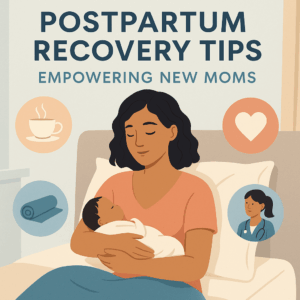What is Postpartum Depression?

Most new moms experience “baby blues” or a period where they feel a little down after giving birth. However, if the baby blues don’t go away, it could be a sign of postpartum depression. Postpartum depression is a severe form of clinical depression that is related to pregnancy and childbirth.
What is postpartum depression?
Postpartum depression is a type of depression that you may get after having a baby, and it is rather common. About one in seven moms get postpartum depression. This depression can start any time during a baby’s first year, but it is the most common around three weeks after childbirth. If you have it, you will have the symptoms of depression, and you may not feel like bonding or caring for your baby.
Postpartum depression can affect any mom, whether they have had a baby before or it’s their first time giving birth. There is no specific cause for postpartum depression, but it can be related to hormones, a history of depression, and stress around having a baby. The sudden drop in hormones after giving birth, a history of depression in your family or your own life, and a complicated situation surrounding being pregnant and the birthing process can all contribute to postpartum depression.
There is no specific way to prevent postpartum depression from happening, but there are ways to treat it quickly. Some women experience the symptoms of depression before they give birth, which is called peripartum depression, and it can be treated with therapy and medication. If you are concerned about getting depression after giving birth, you can work closely with your healthcare provider or therapist for the first 12 months of your baby’s life.
The good news is postpartum depression improves tremendously with clinical treatment. Whether you decide to undergo therapy or start taking medication, treatment for postpartum depression works, and it can help you and your baby’s current and future health.
